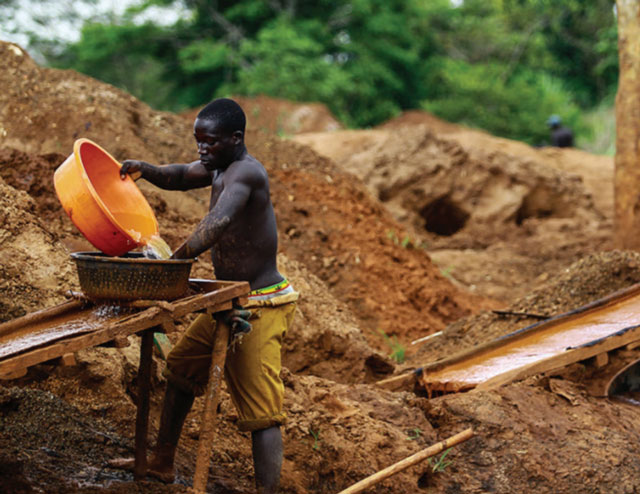
Mercury: Slow killer in Uganda’s gold mines
Kampala, Uganda | RONALD MUSOKE | Inside one of the dozens of gold camps that dot the foothills and valleys of Mubende in central Uganda, the hustle and bustle is astounding.
“Saigon City” nestled in the valley of Kayonza; Kitumbi Sub-County is one such camp. Here, hundreds of Ugandan, Kenyan, Rwandan and Congolese men are armed with pick-axes, hoes, spades and shovels and busy burrowing into the belly of the hill looking for the elusive gold veins.
Under short tree shades and shacks dressed with blue tarpaulins, women and young boys pound gold-laden rocks in motors with pestles to get fine gold dust.
There are more women nearby standing in shallow pits full of dirty brown water. With their backs hunched for hours, the women constantly stir a brown solution in plastic basins comprising the gold-dust, water and a few drops of mercury.
The women and young men get chatty and seem to enjoy the banter flying about as they go through the painstaking process of searching for gold.
If they are lucky and eventually find the little specks of gold, usually the size of a pigeon pea, the gold buyers seated in other make-shift structures in the camp will be on hand to pick, test the gold specks for purity.
The gold buyers sometimes put the specks of gold on a spoon or even a ladle-like apparatus and burn it under a sizzling fire, which is usually a Bunsen burner. At this stage, it is the mercury which is unwanted and it will be subjected to heat.
In just a few seconds, it evaporates leaving behind an even smaller speck of gold. The gold buyer once satisfied with the quality, pays up, stores his treasure while the miner goes back to the mine happy.
But behind the quick cash deals going on in the camps is the health hazard that experts are now warning could worsen in the coming years unless the use of mercury in these mines is checked.
Since 2008, which saw the onset of the gold rush across Uganda, officials from the Directorate of Geological Survey and Mines (DGSM) say artisanal and small scale gold mining activities have risen by 40% across Uganda’s gold-rich areas of Karamoja in north-eastern Uganda, Buhweju and Ibanda in the west and Namayingo and Busia in south-eastern Uganda.
The number of Ugandans directly involved in artisanal and small scale mining has doubled in the last five years to an estimated 400,000 people with another 1.5 million indirectly benefitting from the sector.
With the urge to make money quickly, the miners have thrown caution to the wind and are deploying the most rudimentary means to mine the gold, thanks to the industry’s lack of regulations. As a result, even mercury which is a banned substance around the world is heavily used in Uganda’s gold mining sector.
Given that gold particles are so fine that they cannot be seen with the naked eye, the dust is usually mixed with water in a basin and stirred to form a muddy solution. Just like a magnet, mercury attracts almost all the gold particles in the powder, easily isolating worthless dirt from the precious metal.
Catherine Nyakecho, a geologist based at the Directorate of Geological Survey of Mines told The Independent that for artisanal miners to get gold from the ground rock, they use mercury because it acts as an amalgam for gold.
Don Bwesigye Binyina, the executive director of the African Centre for Energy and Mineral Policy (ACEMP) also told The Independent that because it is cheap to get mercury which does the job well for the artisans, it is not easy to wean the miners off the heavy metal.
For the miners, the cost of mercury is a negligible price to pay considering that a gram of gold will fetch at least Shs85, 000 in the gold camps.
Problem is mercury is harmful to human health when people get into contact with it. It has been noted to cause, among other health conditions—brain damage, digestive problems, kidney failure, a weakened immune system and loss of vision.
 The Independent Uganda: You get the Truth we Pay the Price
The Independent Uganda: You get the Truth we Pay the Price



Have you ever thought about creating an ebook oor guest authoring
on other sites? I have a blog centered on the same information you discuss and would
really like to have you sare some stories/information.
I know my viewers would enjoy yoour work. If you are even remotely interested, feel free to
send mee an e-mail.
Can I simply sayy what a comfort to find somebody who actually knowqs what they’re discussing on the internet.
You definitely undeestand how to bring a problem to light and make it important.
More people ought to check this out and understand this side of your story.
I was surprised that you aren’t more popular since you certainly havce the gift.
This web site certainly has all the info I needed about this subject and didn’t know who to
ask.
Appreciating the persistence you put into your site and iin depth information you offer.
It’s nice to come across a blog every once in a while that
isn’t the same outdated rehashed information. Fantastic read!
I’ve bookmarked your site and I’m adding your RSS feeds to my Google account.
Good article. You should cross over here and advocate our poor minirs as well.
Nice post. I was checking constantly this blog and I’m inspired!
Very useful information psrticularly the last section 🙂 I mainyain such info a lot.
I was seeking this particular information ffor a very lengthy time.
Thank you and good luck.
Howdy! Quick question that’s entirely off topic. Do you know how to make
your site mobile friendly? My weblog looks weirdd when viewing from
my iphone4. I’m trying to find a template or plugin that might be abloe to fix this problem.
If you have any recommendations, please share. With thanks!